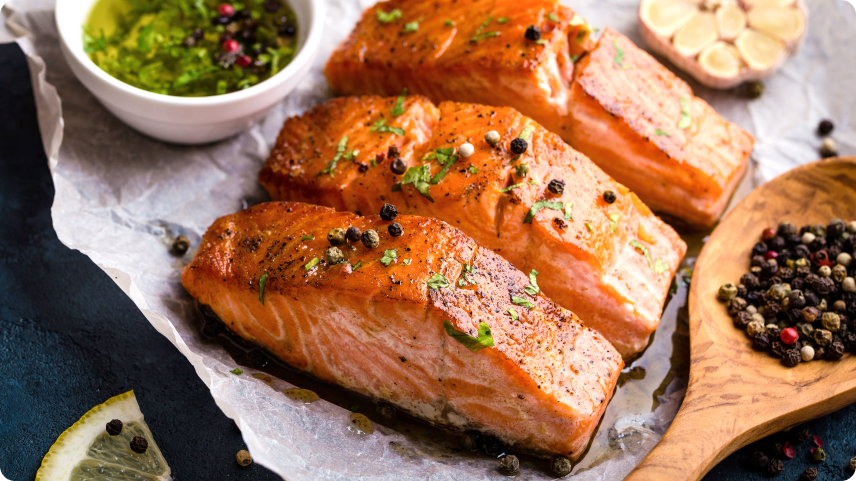Nutrition for Golfers 101

Did you know that golf has been played for over 500 years? This sport is popular with many people and is very competitive. It’s a skill-based sport with a single round taking 3-5 hours and golfers walking anywhere from 7 km to 20.
Golf training can be very demanding, whether you’re trying to boost your skills or playing practice rounds. You might also do additional training that involves resistance exercise conditioning and flexibility drills. It’s therefore important to stay fueled both while you train and when you’re off competing.
Energy for activity
In general, golf is a moderately active sport, burning around 1000 calories per round, but the number can vary significantly1. The movements you do while playing the sport can be divided into two types, the swing, and the walking with or without clubs.
The swing is an anaerobic movement, meaning that the bulk of your energy for this movement will be from the phosphocreatine in your muscle2. The walking on the other hand, is aerobic, so you’ll be dependent on burning carbohydrates and fat during this movement3.
Therefore, getting enough carbohydrate to fuel your rounds is key. Here’s an easy summary of what your intakes should be depending on what you’re focusing on in your training4:
- As a rule of thumb, don’t go under 30 calories/kg of fat-free mass at any point;
- If you’re golfing or strength training, get 5-7 g of carbohydrate per kilo of bodyweight;
- If you’re doing aerobic exercise, get 6-10 g of carbs per kilo of bodyweight;
- Get around 30-45 g of carbohydrate per kilo of fat free mass daily.
Choose healthy long-release sources of carbs, which include brown rice and porridge, as this can prevent tiredness5.

Protein and its importance
Protein is essential for your muscle mass. Aim to get 1.2-2.0 g of protein per kilo of bodyweight6. If you’re on a longer course, have more protein7. It’s important to get 15-25 g of protein within two hours of your training to kickstart recovery8. Make sure to include sources of branched chain amino acids, which support muscle building9.
A great way to get some protein in quickly or after a training session is to have a protein shake. Maxler 100% Golden Whey is a great option for a quick protein boost, providing 24 g of protein with a delicious taste. Additionally, consider the new Maxler Golden 7, which combines multiple types of protein for long-lasting fuel.
Healthy fats – what to pay attention to
One overlooked aspect of nutrition is fat intake. It’s important to get enough fats, especially essential fatty acids, as they support the absorbance of key nutrients. Therefore, get at least 20% of your calories from fats, prioritizing fatty acids like omega-310.
If you’re not getting a lot of seafood, you might find it harder to meet your requirements for essential fatty acids.

Getting enough water
Golfers should pay extreme attention to their water intake, especially in the summer. Dehydration directly affects your distance judgment, accuracy and shot length11. Additionally sweat cools you, which allows your body to absorb nutrients as normal12.
Make sure that you hydrate before a golf round, drinking around 2-4 ml per pound of bodyweight. Drink around 400-800 milliliters of water every hour while playing. Cold water can further help with heat13.
Adding electrolytes and using sports drinks can be a great way to boost hydration during a round14. Maxler Electrolyte Powder is a sugar-free supplement providing you with key electrolytes and trace minerals to ensure top performance.Eating on the course
One of the most important things to keep in mind is your carbohydrate intake during the game. Your glycogen, or energy stores, get depleted very quickly, so you need to offer your body more fuel15. Aim to get 30-60 g of carbohydrate every hour during your rounds16.
There are many ways to fuel yourself during the round. Have small, healthy snacks frequently, as it will help with energy and concentration. Consider having simple bite-sized snacks in your bag, like fruit, sandwiches, nuts, or crackers17.
Taking performance to a higher level
Supplements can be useful whether you’ve got a busy tournament schedule or if you’re trying to get a boost on your competitors.
If you’ve got plenty of things lined up, you might need extra support with taking in sufficient micronutrients. If that’s the case, try Maxler VitaMen and VitaWomen, which are multivitamin formulas containing additional ingredients for performance and health. During the colder months, don’t forget to get enough vitamin D to support immunity18 – Maxler Vitamin D3 5000 IU drops are a great option for athletes. Simply pour a few drops into your water bottle!
For a performance boost, there are three key supplements for golfers: creatine, BCAAs and caffeine.
Creatine can improve your driver distance, support your swings and boost your recovery19. Maxler 100% Golden Creatine is the safest and most well-researched form of creatine20. It comes in handy sachets, allowing you to get your fill on the go.
BCAAs are a combination of amino acids that do wonders for recovery and help protect muscle from damage. They can be especially good at preventing muscle loss during times when you haven’t eaten enough, making them a great aid on the golf course21. For a quick boost, consider 100% Golden BCAA. If you’re looking for a higher dose, BCAA 8400 can be a good option.
Finally, caffeine is a supplement that is very popular with golfers. It can help with fighting tiredness, improving your score, accuracy, and driving distance22. Maxler Caffeine 200 is an easy way to get in some caffeine if you’re not a big fan of coffee.









